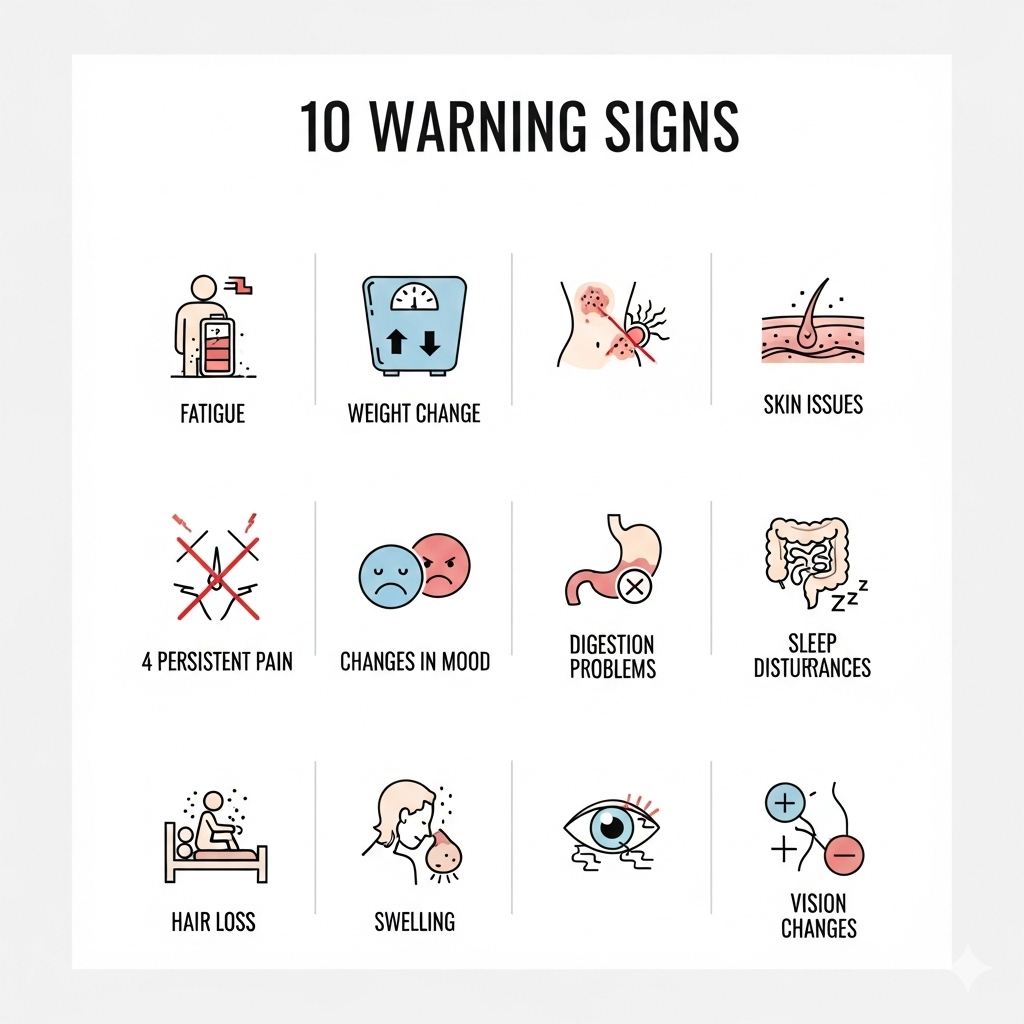What Your Body Is Trying to Tell You: Early Signs You Shouldn’t Ignore
Our bodies are constantly communicating with us. From subtle changes in energy levels to unexpected pains, the body often sends warning signals before a serious health issue develops. Unfortunately, many people brush off these early signs, dismissing them as minor inconveniences or part of aging. But ignoring these signals can sometimes lead to bigger problems down the road.
In this blog, we’ll explore the most common early signs your body uses to alert you about your health, why they happen, and what you should do when you notice them.

Why Paying Attention to Early Signs Matters
Health conditions rarely appear out of nowhere. Most diseases—whether it’s diabetes, heart disease, cancer, or thyroid disorders—develop slowly over time. Before they reach a severe stage, your body often drops subtle hints that something is off.
Listening to these early signals gives you the chance to:
- Prevent progression: Addressing a small issue early can stop it from becoming a chronic condition.
- Avoid complications: Early detection often means simpler treatments and fewer side effects.
- Protect overall well-being: Timely lifestyle changes can restore balance and prevent long-term damage.
- Unexplained Fatigue
Feeling tired after a long day is normal, but if you constantly feel drained despite getting enough rest, it’s worth paying attention. Chronic fatigue can be a sign of several underlying health issues, including:
- Anemia (low iron levels)
- Thyroid problems (hypothyroidism or hyperthyroidism)
- Diabetes
- Heart disease
- Chronic infections
If fatigue is accompanied by dizziness, shortness of breath, or palpitations, it’s best to consult a doctor.
What to do: Track your sleep, diet, and activity levels. If fatigue persists for more than two weeks, seek medical advice.
A wearable fitness tracker can help you monitor your sleep and activity levels at home. Check this one on Amazon
- Sudden Weight Changes
A few pounds gained or lost here and there is normal, but rapid or unexplained changes in body weight can signal trouble.
- Unexplained weight lossmight indicate diabetes, hyperthyroidism, digestive disorders, or even certain cancers.
- Sudden weight gainwithout lifestyle changes can be linked to hypothyroidism, hormonal imbalances, or fluid retention from heart/kidney issues.
What to do: Keep an eye on your weight trends. If you notice significant changes without changes in diet or exercise, get checked.

- Persistent Digestive Problems
Digestive discomfort is often brushed off as minor, but recurring issues may point to deeper problems.
- Chronic bloatingcould signal food intolerances, IBS, or even ovarian issues in women.
- Persistent heartburnmay indicate acid reflux, which can damage the esophagus if untreated.
- Frequent constipation or diarrheamight signal dietary deficiencies, thyroid disorders, or gut infections.
What to do: Maintain a food diary to identify triggers. If symptoms last longer than two weeks, see a doctor.
- Skin and Hair Changes
Your skin and hair can be windows into your internal health.
- Dry, brittle hairmay indicate thyroid problems or nutritional deficiencies.
- Yellowish skin or eyescould be a sign of liver issues.
- Dark patches on the neck or armpitsmay point to insulin resistance or prediabetes.
- Unexplained bruising or rashescould indicate blood disorders or autoimmune conditions.
What to do: Don’t just cover up skin changes with creams. Persistent or sudden changes deserve a medical evaluation.
This Digital Weighing Scale with Body Composition Monitor will check everything and try this product in Amazon
- Shortness of Breath
Struggling to breathe after climbing stairs is one thing, but experiencing shortness of breath during normal activities can be alarming.
Possible causes include:
- Asthma or allergies
- Heart conditions
- Lung problems (such as COPD or infections)
- Anemia
What to do: If shortness of breath is sudden, severe, or accompanied by chest pain, seek emergency medical care immediately.
- Frequent Thirst and Urination
If you find yourself constantly thirsty and running to the bathroom more than usual, it may be a red flag.
These are classic early signs of diabetes, especially if combined with unexplained weight loss, blurred vision, or fatigue.
What to do: Get a blood sugar test. Early diabetes can often be managed with lifestyle changes and medication.
- Chest Discomfort
Not all chest pain is a heart attack, but it should never be ignored. Even mild chest discomfort—such as pressure, tightness, or burning—can be an early sign of heart disease or acid reflux.
What to do: If chest pain is persistent, radiates to the arm/jaw/back, or occurs with sweating or dizziness, call emergency services immediately.
- Persistent Cough or Hoarseness
A cough that lingers for weeks without improvement isn’t always a simple cold. It can signal:
- Asthma or chronic bronchitis
- Acid reflux
- Allergies
- Lung conditions, including infections or cancer
What to do: If a cough lasts more than three weeks or is accompanied by blood, weight loss, or night sweats, consult a doctor immediately.
- Memory Problems or Brain Fog
Occasional forgetfulness is normal, but frequent confusion, poor focus, or memory lapses can be a sign of:
- Vitamin B12 deficiency
- Thyroid problems
- Stress and sleep deprivation
- Early dementia or neurological issues
What to do: Track patterns in memory lapses. A medical evaluation can rule out reversible causes.
You can try this product from Amazon
- Pain That Doesn’t Go Away
Persistent pain, whether in the joints, back, or elsewhere, shouldn’t be dismissed as “just aging.”
- Joint paincould indicate arthritis or autoimmune conditions.
- Back painmay result from posture, but persistent pain might signal spinal issues or kidney problems.
- Headachesthat don’t respond to rest could be linked to vision problems, migraines, or neurological conditions.
What to do: Don’t rely solely on painkillers. Identify the root cause with professional help.
When to Seek Medical Help Immediately
While some symptoms can wait for a doctor’s appointment, others require urgent attention. Call emergency services if you experience:
- Sudden chest pain or pressure
- Difficulty breathing
- Sudden weakness or numbness (possible stroke)
- Severe headache with vision or speech issues
- Blood in urine, stool, or cough
Listening to Your Body: The Takeaway
Your body is a powerful communicator. While it’s easy to dismiss fatigue, digestive discomfort, or skin changes as “normal,” these early warning signs can reveal important clues about your health. By paying attention, you give yourself the best chance to catch problems early, prevent complications, and maintain long-term wellness.
Remember: prevention is always better than cure. So, the next time your body whispers, don’t wait until it screams—listen and take action.








